Today we are heading to the
nearest border at Pont Drift. The border
crosses the Limpopo River, but there is no bridge, so is only usable when the
water level is low. It is a tiny border and the only people there are staff. In
no time at all our passports are stamped out of South Africa, but they have no
customs to stamp our carnet. With a bit of coaxing the police stamp our carnet
and we fill in the gaps. Time to cross that river. Apart from going down the
wrong track to start with, which amuses the border control, it is a simple
drive over a gravel causeway.
Welcome back to Botswana. We fill
in the book and discover we are the third vehicle this year (and its now Sept)
to cross the border in this direction! Paperwork sorted we hit the road or
rather the gravel track.
What we didn’t realise was that
this whole area or Tuli Block as it is known, is a private game reserve. There
are signs up to stay on the main track. It is so dry and arid that we don’t
really expect to see anything, but are pleasantly surprised when we see some
giraffes and then elephants drinking at a water hole. But then I spy some
shapes under a tree and yell “Stop, stop, go back!!!”, and to our surprise
there are cheetahs sitting under a tree only 4 metres from the road. SIX OF THEM
WOW!!! We stop and watch for ages. It is a hot day and they just want to
snooze, only looking up when John revs the engine. Eventually they get up one at a time and jog
across the road in front of us. Only one vehicle went by while we were there. A
local guide who told us the cheetahs live in this area and they have been
looking for them for the last 6 weeks! Our first best kept secret!
We move on and continue through
miles of dry desert like area with some interesting rock formations, until we
finally reach the scruffy town of Bobonong where we can finally fill up with
diesel. Much later we are pleased to finally see tarseal just before the huge
town of Selebi-Phikwe. It is nearly dusk so we head straight to the Phokoje
Bush Lodge to camp for the night. We will get groceries tomorrow. Fortunately,
they have an awesome restaurant here or our meal would be been pretty basic!
Back to town and the supermarket,
where we discover that there has been an outbreak of foot and mouth in the area,
so no cattle are being killed, resulting in no meat in the shops. Much later we
head west to Serule and then north to Francistown. Not much to see in town, but
our guide book mentions a tiny museum so we head there after driving along the
main drag. We find the Supa-Ngwao Museum inside a lovely old house (very much
like an old Queenslander) and the new curator insists on showing us around. His
enthusiasm is contagious, and we find we enjoy the rather ho-hum exhibits. But the day is rushing by, so we hit the long
flat road towards the huge salt pans we want to camp on. We pull over for the
night at Moriti Wa Selemo and have to navigate past lots of nasty scratchy
trees to find the camping area. In the morning the camp owner tells us about Kukonje
Island on the Ntwetwe Pan where we can camp, so we decide to go and see it for ourselves.
His instructions aren’t too
difficult to follow, we only turn around once, before we reach the Vet Fence that
we have to follow. The Vet Post at the entrance is long abandoned so we head on
in, across the huge flat saltpan and over to Kukonje Island. The camp ground is falling apart so we head
up to the lookout for views across the pan, then slowly explore the camp spots
and pick a spot for the night. Not a soul in sight! Awesome. Our second best kept secret!
After a long walk on the pan, we
head back out and onto the main road. Time to head out to Lekhubu Island. A
long drive down unmarked tracks with not another vehicle in sight. We are
relieved when the scratchy bushes finish and we head onto the salt pan and out
to the Island. No other campers in sight, but they start to arrive and before
we know it our campspot is surrounded. Definitely not a best kept secret.
Travellers in a 4x4 have got stuck out on the pan and ask for help – but they
are well off the track and we can’t risk being bogged (who will pull us out!),
so another 4x4 goes out. John walks out to check they are OK and finds both
vehicles bogged. Fortunately, his expertise manages to get them both out!
In the morning we explore the
island, admire the huge gleaming white pan and the crazy baobab trees dotted
all over the rocky island. Time now to retrace our steps and then miles and
miles of tarseal road, most of which we have driven before when heading to
Joberg for our new springs. Our funny moment today is when an ambulance passes
us and pulls us over. “Something fell off your roof!” We go back and find our
air-cond cover in a crumpled heap beside the road. No use to us any more so we
leave it there in the hope that it will become part of someone’s sign at their
farm entry. They tie up an assortment of junk instead of a sign! Much later we stop for the night at Rock City
Camping. They are closed because they have no water or electricity, but will
let us stay at a reduced price.
Then it is the long drive to
Gaborone which proves to be our third best kept secret. We head down the main
road, loop around quite a few side streets and are surprised by the number of
innovative new buildings. That diamond money is on display here! We find a brand-new
shopping centre to fill up with food and before we leave the city we fill up
with fuel. Then a long drive to Kanye where we head to the recommended
campsite. We are too tall to get into their camping area, but we can use the
carpark, but as their fees have doubled recently, we decide to go next door to Wena
Campground. A bit run down, but half the price. The pool is more suited for
kids but great to cool down in as it has been stinking hot today at 36deg.
Lots more flat driving (Botswana
is really really flat) to Secoma and then Jwaneng where we spy hills. But they
are not hills, they are massive slag heaps. We discover that this is the
richest diamond mine in the world. It is midday by the time we see signs to
Kgalagadi Transfrontier National Park. We decide to drive in this way, but all
we can see is miles of red sand track. As the sand gets deeper, we stop to re-evaluate.
It is really hot and there is over 100km of this thick sand to go. We decide to
give this track a miss and head further south to Tsabong. Perhaps the second
entry will look better! We overnight at the Camel Refuge Camp and try our luck
on the second track in the morning.
We head along the second track,
finding it much better. The first 80km is gravel, then some rather deep
potholes before the track becomes thick sand. But we manage to arrive at the Kgalagadi
Gate. Now our next obstacle. We have no reservation, so a bit of grovelling,
they ring the office, and find us a spot in one of the less desirable camps. It
will do! We are in. At least there are not too many scratchy bushes. We find
our camp site and set up before heading off to explore. Not much to report
except that it is much greener than expected due to heavier than usual rains
earlier this year. But again, not much in the way of wildlife. On our second
days drive we meet 2 South African couples who invite us to stay on their much-desired
campsite on the Mpayathutlwa Pan. We have a lovely time chatting and after dark
hear lions roaring incredibly close. When they get really close, we leave our
campfire and head to our vehicles for the night. In the morning we all head out
to track the lion. And we are successful! We find him at the waterhole and he
is massive. John thought it was a wildebeest at first, he was so big. We watch,
then follow him as he walks down our track, roaring as he goes. Awesome. Our
first big Kalahari Lion. The Kgalagadi has become our 4th best kept
secret.
We say our goodbyes and head back
to our booked campsite to collect our table and chairs only to discover that a
hyena has chewed up our bucket and the top of one of our chairs! Then it is the
long drive out to Tsabong where we fill up with diesel. Finally, we head to the
border of South Africa. Goodbye Botswana, we have really enjoyed our visit.










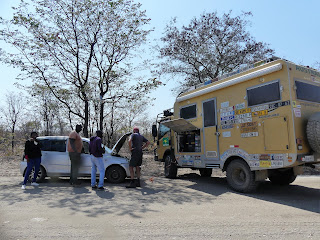













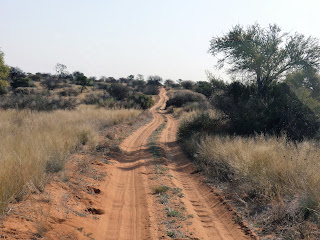



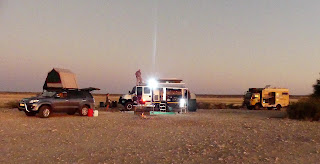


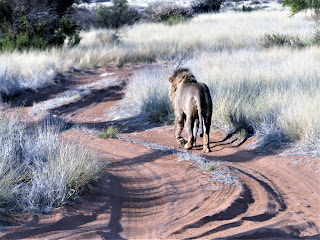


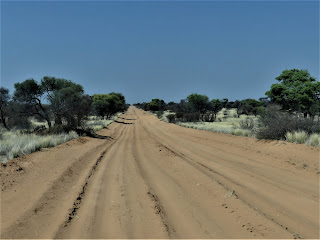



.JPG)
.JPG)
.JPG)

.JPG)
.JPG)
.JPG)
.JPG)

.JPG)

.JPG)



.JPG)
.JPG)
.JPG)




.JPG)
.JPG)




.JPG)

.JPG)
.JPG)